Criminal Justice (Mutual Assistance) Act 2008
F179[SCHEDULE 5B
Text of 2006 Framework Decision
COUNCIL FRAMEWORK DECISION 2006/783/JHA of 6 October 2006
on the application of the principle of mutual recognition to confiscation orders
THE COUNCIL OF THE EUROPEAN UNION,
Having regard to the Treaty on European Union, and in particular Articles 31(1)(a) and 34(2)(b) thereof,
Having regard to the initiative of the Kingdom of Denmark1,
Having regard to the opinion of the European Parliament2,
Whereas:
(1) The European Council, meeting in Tampere on 15 and 16 October 1999, stressed that the principle of mutual recognition should become the cornerstone of judicial cooperation in both civil and criminal matters within the Union.
(2) According to paragraph 51 of the conclusions of the Tampere European Council, money laundering is at the very heart of organised crime, and should be rooted out wherever it occurs; the European Council is determined to ensure that concrete steps are taken to trace, freeze, seize and confiscate the proceeds of crime. In that connection, in paragraph 55 of the conclusions, the European Council calls for the approximation of criminal law and procedures on money laundering (e.g. tracing, freezing and confiscating funds).
(3) All Member States have ratified the Council of Europe Convention of 8 November 1990 on Laundering, Search, Seizure and Confiscation of the Proceeds from Crime (the 1990 Convention). The Convention obliges signatories to recognise and enforce a confiscation order made by another party, or to submit a request to its competent authorities for the purpose of obtaining an order of confiscation and, if such order is granted, enforce it. The Parties may refuse requests for confiscation inter alia if the offence to which the request relates would not be an offence under the law of the requested Party, or if under the law of the requested Party confiscation is not provided for in respect of the type of offence to which the request relates.
(4) On 30 November 2000 the Council adopted a programme of measures to implement the principle of mutual recognition of decisions in criminal matters, giving first priority (measures 6 and 7) to the adoption of an instrument applying the principle of mutual recognition to the freezing of evidence and property. Moreover, pursuant to paragraph 3.3 of the programme, the aim is to improve, in accordance with the principle of mutual recognition, execution in one Member State of a confiscation order issued in another Member State, inter alia for the purpose of restitution to a victim of a criminal offence, taking into account the existence of the 1990 Convention. With a view to achieving this aim, this Framework Decision, within its field of application, reduces the grounds for refusal of enforcement and suppresses, among Member States, any system of conversion of the confiscation order into a national one.
(5) Council Framework Decision 2001/500/JHA3 lays down provisions on money laundering, the identification, tracing, freezing, seizing and confiscation of instrumentalities and the proceeds from crime. Under that Framework Decision, Member States are also obliged not to make or uphold reservations in respect of Article 2 of the 1990 Convention, in so far as the offence is punishable by deprivation of liberty or a detention order for a maximum of more than one year.
(6) Finally, on 22 July 2003 the Council adopted Framework Decision 2003/577/JHA on the execution in the European Union of orders freezing property or evidence4.
(7) The main motive for organised crime is financial gain. In order to be effective, therefore, any attempt to prevent and combat such crime must focus on tracing, freezing, seizing and confiscating the proceeds from crime. It is not enough merely to ensure mutual recognition within the European Union of temporary legal measures such as freezing and seizure; effective control of economic crime also requires the mutual recognition of orders to confiscate the proceeds from crime.
(8) The purpose of this Framework Decision is to facilitate cooperation between Member States as regards the mutual recognition and execution of orders to confiscate property so as to oblige a Member State to recognise and execute in its territory confiscation orders issued by a court competent in criminal matters of another Member State. This Framework Decision is linked to Council Framework Decision 2005/212/JHA of 24 February 2005 on Confiscation of Crime-Related Proceeds, Instrumentalities and Property5. The purpose of that Framework Decision is to ensure that all Member States have effective rules governing the confiscation of proceeds from crime, inter alia in relation to the onus of proof regarding the source of assets held by a person convicted of an offence related to organised crime.
(9) Cooperation between Member States, based on the principle of mutual recognition and immediate execution of judicial decisions, presupposes confidence that the decisions to be recognised and executed will always be taken in compliance with the principles of legality, subsidiarity and proportionality. It also presupposes that the rights granted to the parties or bona fide interested third parties will be preserved. In this context, due consideration should be given to preventing successful dishonest claims by legal or natural persons.
(10) The proper practical operation of this Framework Decision presupposes close liaison between the competent national authorities involved, in particular in cases of simultaneous execution of a confiscation order in more than one Member State.
(11) The terms "proceeds" and "instrumentalities" used in this Framework Decision are sufficiently broadly defined to include objects of offences whenever necessary.
(12) Where there are doubts with regard to the location of property which is the subject of a confiscation order, Member States should use all available means in order to identify the correct location of that property, including the use of all available information systems.
(13) This Framework Decision respects fundamental rights and observes the principles recognised by Article 6 of the Treaty on European Union and reflected by the Charter of Fundamental Rights of the European Union, in particular Chapter VI thereof. Nothing in this Framework Decision may be interpreted as prohibiting refusal to confiscate property for which a confiscation order has been issued when objective grounds exist for believing that the confiscation order was issued for the purpose of prosecuting or punishing a person on account of his or her sex, race, religion, ethnic origin, nationality, language, political opinion or sexual orientation, or that that person's position may be prejudiced for any of these reasons.
(14) This Framework Decision does not prevent any Member State from applying its constitutional rules relating to due process, freedom of association, freedom of the press and freedom of expression in other media.
(15) This Framework Decision does not address the restitution of property to its rightful owner.
(16) This Framework Decision does not prejudice the end to which the Member States apply the amounts obtained as a consequence of its application.
(17) This Framework Decision does not affect the exercise of the responsibilities incumbent upon Member States with regard to the maintenance of law and order and the safeguarding of internal security in accordance with Article 33 of the Treaty on European Union,
HAS ADOPTED THIS FRAMEWORK DECISION:
Article 1
Objective
1. The purpose of this Framework Decision is to establish the rules under which a Member State shall recognise and execute in its territory a confiscation order issued by a court competent in criminal matters of another Member State.
2. This Framework Decision shall not have the effect of modifying the obligation to respect fundamental rights and fundamental legal principles as enshrined in Article 6 of the Treaty on European Union, and any obligations incumbent on judicial authorities in this respect shall remain unaffected.
Article 2
Definitions
For the purpose of this Framework Decision,
(a) "issuing State" shall mean the Member State in which a court has issued a confiscation order within the framework of criminal proceedings;
(b) "executing State" shall mean the Member State to which a confiscation order has been transmitted for the purpose of execution;
(c) "confiscation order" shall mean a final penalty or measure imposed by a court following proceedings in relation to a criminal offence or offences, resulting in the definitive deprivation of property;
(d) "property" shall mean property of any description, whether corporeal or incorporeal, movable or immovable, and legal documents and instruments evidencing title to or interest in such property, which the court in the issuing State has decided:
(i) is the proceeds of an offence, or equivalent to either the full value or part of the value of such proceeds,
or
(ii) constitutes the instrumentalities of such an offence,
or
(iii) is liable to confiscation resulting from the application in the issuing State of any of the extended powers of confiscation specified in Article 3(1) and (2) of Framework Decision 2005/212/JHA,
or
(iv) is liable to confiscation under any other provisions relating to extended powers of confiscation under the law of the issuing State;
(e) "proceeds" shall mean any economic advantage derived from criminal offences. It may consist of any form of property;
(f) "instrumentalities" shall mean any property used or intended to be used, in any manner, wholly or in part, to commit a criminal offence or criminal offences;
(g) "cultural objects forming part of the national cultural heritage" shall be defined in accordance with Article 1(1) of Council Directive 93/7/EEC of 15 March 1993 on the return of cultural objects unlawfully removed from the territory of a Member State6;
(h) where the criminal proceedings leading to a confiscation order involve a predicate offence as well as money laundering, a "criminal offence" mentioned in Article 8(2) (f) shall mean a predicate offence.
Article 3
Determination of the competent authorities
1. Each Member State shall inform the General Secretariat of the Council which authority or authorities, under its law, are competent according to this Framework Decision when that Member State is:
— the issuing State,
or
— the executing State.
2. Notwithstanding Articles 4(1) and (2), each Member State may designate, if it is necessary as a result of the organisation of its internal system, one or more central authorities responsible for the administrative transmission and reception of the confiscation orders and to assist the competent authorities.
3. The General Secretariat of the Council shall make the information received available to all Member States and the Commission.
Article 4
Transmission of confiscation orders
1. A confiscation order, together with the certificate provided for in paragraph 2, the standard form for which is given in the Annex, may, in the case of a confiscation order concerning an amount of money, be transmitted to the competent authority of a Member State in which the competent authority of the issuing State has reasonable grounds to believe that the natural or legal person against whom the confiscation order has been issued has property or income.
In the case of a confiscation order concerning specific items of property, the confiscation order and the certificate may be transmitted to the competent authority of a Member State in which the competent authority of the issuing State has reasonable grounds to believe that property covered by the confiscation order is located.
If there are no reasonable grounds which would allow the issuing State to determine the Member State to which the confiscation order may be transmitted, the confiscation order may be transmitted to the competent authority of the Member State where the natural or legal person against whom the confiscation order has been issued is normally resident or has its registered seat respectively.
2. The confiscation order or a certified copy thereof, together with the certificate, shall be transmitted by the competent authority of the issuing State directly to the authority of the executing State which is competent to execute it, by any means capable of producing a written record, under conditions allowing the executing State to establish authenticity. The original of the confiscation order, or a certified copy thereof, and the original of the certificate shall be transmitted to the executing State if it so requires. All official communications shall be made directly between the said competent authorities.
3. The certificate, shall be signed, and its contents certified as accurate, by the competent authority of the issuing State.
4. If the authority competent to execute the confiscation order is not known to the competent authority of the issuing State, the latter shall make all necessary enquiries, including via the contact points of the European judicial network, in order to obtain information from the executing State.
5. Where the authority of the executing State which receives a confiscation order has no jurisdiction to recognise it and take the necessary measures for its execution, it shall, ex officio, transmit the order to the authority competent to execute it, and shall inform the competent authority of the issuing State accordingly.
Article 5
Transmission of a confiscation order to one or more executing States
1. Subject to paragraphs 2 and 3, a confiscation order may only be transmitted pursuant to Article 4 to one executing State at any one time.
2. A confiscation order concerning specific items of property may be transmitted to more than one executing State at the same time in cases where:
— the competent authority of the issuing State has reasonable grounds to believe that different items of property covered by the confiscation order are located in different executing States,
— the confiscation of a specific item of property covered by the confiscation order involves action in more than one executing State,
or
— the competent authority of the issuing State has reasonable grounds to believe that a specific item of property covered by the confiscation order is located in one of two or more specified executing States.
3. A confiscation order concerning an amount of money may be transmitted to more than one executing State at the same time, where the competent authority of the issuing State deems there is a specific need to do so, for example where:
— the property concerned has not been frozen under Council Framework Decision 2003/577/JHA of,
or
— the value of the property which may be confiscated in the issuing State and any one executing State is not likely to be sufficient for the execution of the full amount covered by the confiscation order.
Article 6
Offences
1. If the acts giving rise to the confiscation order constitute one or more of the following offences, as defined by the law of the issuing State, and are punishable in the issuing State by a custodial sentence of a maximum of at least three years, the confiscation order shall give rise to execution without verification of the double criminality of the acts:
— participation in a criminal organisation,
— terrorism,
— trafficking in human beings,
— sexual exploitation of children and child pornography,
— illicit trafficking in narcotic drugs and psychotropic substances,
— illicit trafficking in weapons, munitions and explosives,
— corruption,
— fraud, including that affecting the financial interests of the European Communities within the meaning of the Convention of 26 July 1995 on the protection of the European Communities' financial interests,
— laundering of the proceeds of crime,
— counterfeiting currency, including of the euro,
— computer-related crime,
— environmental crime, including illicit trafficking in endangered animal species and in endangered plant species and varieties,
— facilitation of unauthorised entry and residence,
— murder, grievous bodily injury,
— illicit trade in human organs and tissue,
— kidnapping, illegal restraint and hostage-taking,
— racism and xenophobia,
— organised or armed robbery,
— illicit trafficking in cultural goods, including antiques and works of art,
— swindling,
— racketeering and extortion,
— counterfeiting and piracy of products,
— forgery of administrative documents and trafficking therein,
— forgery of means of payment,
— illicit trafficking in hormonal substances and other growth promoters,
— illicit trafficking in nuclear or radioactive materials,
— trafficking in stolen vehicles,
— rape,
— arson,
— crimes within the jurisdiction of the International Criminal Court,
— unlawful seizure of aircraft/ships,
— sabotage.
2. The Council may decide to add other categories of offences to the list contained in paragraph 1 at any time, acting unanimously after consultation of the European Parliament under the conditions laid down in Article 39(1) of the TEU. The Council shall consider, in the light of the report submitted by the Commission pursuant to Article 22, whether the list should be extended or amended.
3. For offences other than those covered by paragraph 1, the executing State may make the recognition and execution of a confiscation order subject to the condition that the acts giving rise to the confiscation order constitute an offence which permits confiscation under the law of the executing State, whatever its constituent elements or however it is described under the law of the issuing State.
Article 7
Recognition and execution
1. The competent authorities in the executing State shall without further formality recognise a confiscation order which has been transmitted in accordance with Articles 4 and 5, and shall forthwith take all the necessary measures for its execution, unless the competent authorities decide to invoke one of the grounds for non-recognition or non-execution provided for in Article 8, or one of the grounds for postponement of execution provided for in Article 10.
2. If a request for confiscation concerns a specific item of property, the competent authorities of the issuing and the executing States may, if provided for under the law of those States, agree that confiscation in the executing State may take the form of a requirement to pay a sum of money corresponding to the value of the property.
3. If a confiscation order concerns an amount of money, the competent authorities of the executing State shall, if payment is not obtained, execute the confiscation order in accordance with paragraph 1 on any item of property available for that purpose.
4. If a confiscation order concerns an amount of money, the competent authorities of the executing State shall, if necessary, convert the amount to be confiscated into the currency of the executing State at the rate of exchange obtaining at the time when the confiscation order was issued.
5. Each Member State may state in a declaration deposited with the General Secretariat of the Council that its competent authorities will not recognise and execute confiscation orders under circumstances where confiscation of the property was ordered under the extended powers of confiscation referred to in Article 2(d) (iv). Any such declaration may be withdrawn at any time.
Article 8
Reasons for non-recognition or non-execution
1. The competent authority of the executing State may refuse to recognise and execute the confiscation order if the certificate provided for in Article 4 is not produced, is incomplete, or manifestly does not correspond to the order.
2. The competent judicial authority of the executing State, as defined in the law of that State, may also refuse to recognise and execute the confiscation order if it is established that:
(a) execution of the confiscation order would be contrary to the principle of ne bis in idem;
(b) in one of the cases referred to in Article 6(3), the confiscation order relates to acts which do not constitute an offence which permits confiscation under the law of the executing State; however, in relation to taxes, duties, customs duties and exchange activities, execution of a confiscation order may not be refused on the ground that the law of the executing State does not impose the same kind of tax or duty or does not contain the same types of rules concerning taxes, duties, customs duties and exchange activities as the law of the issuing State;
(c) there is immunity or privilege under the law of the executing State which would prevent the execution of a domestic confiscation order on the property concerned;
(d) the rights of any interested party, including bona fide third parties, under the law of the executing State make it impossible to execute the confiscation order, including where this is a consequence of the application of legal remedies in accordance with Article 9;
(e) according to the certificate provided for in Article 4(2), the person concerned did not appear personally and was not represented by a legal counsellor in the proceedings resulting in the confiscation order, unless the certificate states that the person was informed personally, or via his representative competent according to national law, of the proceedings in accordance with the law of the issuing State, or that the person has indicated that he or she does not contest the confiscation order;
(f) the confiscation order is based on criminal proceedings in respect of criminal offences which:
— under the law of the executing State, are regarded as having been committed wholly or partly within its territory, or in a place equivalent to its territory,
or
— were committed outside the territory of the issuing State, and the law of the executing State does not permit legal proceedings to be taken in respect of such offences where they are committed outside that State's territory;
(g) the confiscation order, in the view of that authority, was issued in circumstances where confiscation of the property was ordered under the extended powers of confiscation referred to in Article 2(d) (iv) ;
(h) the execution of a confiscation order is barred by statutory time limitations in the executing State, provided that the acts fall within the jurisdiction of that State under its own criminal law.
3. If it appears to the competent authority of the executing State that:
— the confiscation order was issued in circumstances where confiscation of the property was ordered under the extended powers of confiscation referred to in Article 2(d) (iii),
and
— the confiscation order falls outside the scope of the option adopted by the executing State under Article 3(2) of Framework Decision 2005/212/JHA,
it shall execute the confiscation order at least to the extent provided for in similar domestic cases under national law.
4. The competent authorities of the executing State shall give specific consideration to consulting, by any appropriate means, the competent authorities of the issuing State before deciding not to recognise and execute a confiscation order pursuant to paragraph 2, or to limit the execution thereof pursuant to paragraph 3. Consultation is obligatory where the decision is likely to be based on:
— paragraph 1,
— paragraph 2(a), (e), (f) or (g),
— paragraph 2(d) and information is not being provided under Article 9(3),
or
— paragraph 3.
5. Where it is impossible to execute the confiscation order for the reason that the property to be confiscated has already been confiscated, has disappeared, has been destroyed, cannot be found in the location indicated in the certificate or the location of the property has not been indicated in a sufficiently precise manner, even after consultation with the issuing State, the competent authority of the issuing State shall be notified forthwith.
Article 9
Legal remedies in the executing State against recognition and execution
1. Each Member State shall put in place the necessary arrangements to ensure that any interested party, including bona fide third parties, has legal remedies against the recognition and execution of a confiscation order pursuant to Article 7, in order to preserve his or her rights. The action shall be brought before a court in the executing State in accordance with the law of that State. The action may have suspensive effect under the law of the executing State.
2. The substantial reasons for issuing the confiscation order cannot be challenged before a court in the executing State.
3. If action is brought before a court in the executing State, the competent authority of the issuing State shall be informed thereof.
Article 10
Postponement of execution
1. The competent authority of the executing State may postpone the execution of a confiscation order transmitted in accordance with Articles 4 and 5:
(a) if, in the case of a confiscation order concerning an amount of money, it considers that there is a risk that the total value derived from its execution may exceed the amount specified in the confiscation order because of simultaneous execution of the confiscation order in more than one Member State;
(b) in the cases of legal remedies referred to in Article 9;
(c) where the execution of the confiscation order might damage an ongoing criminal investigation or proceedings, until such time as it deems reasonable;
(d) where it is considered necessary to have the confiscation order or parts thereof translated at the expense of the executing State, for the time necessary to obtain its translation,
or
(e) where the property is already the subject of confiscation proceedings in the executing State.
2. The competent authority of the executing State shall, for the duration of postponement, take all the measures it would take in a similar domestic case to prevent the property from no longer being available for the purpose of execution of the confiscation order.
3. In the case of postponement pursuant to paragraph 1(a), the competent authority of the executing State shall inform the competent authority of the issuing State thereof immediately by any means capable of producing a written record, and the competent authority of the issuing State shall comply with the obligations referred to in Article 14(3).
4. In the cases referred to in paragraph 1(b), (c), (d) and (e), a report on the postponement, including the grounds for the postponement and, if possible, the expected duration of the postponement, shall be made forthwith by the competent authority of the executing State to the competent authority of the issuing State by any means capable of producing a written record.
As soon as the ground for postponement has ceased to exist, the competent authority of the executing State shall forthwith take the necessary measures for the execution of the confiscation order and inform the competent authority of the issuing State thereof by any means capable of producing a written record.
Article 11
Multiple confiscation orders
If the competent authorities of the executing State are processing:
— two or more confiscation orders concerning an amount of money, which have been issued against the same natural or legal person, and the person concerned does not have sufficient means in the executing State to enable all the orders to be executed,
or
— two or more confiscation orders concerning the same specific item of property,
the decision on which of the confiscation orders is or are to be executed shall be taken by the competent authority of the executing State according to the law of the executing State, with due consideration of all the circumstances, which may include the involvement of frozen assets, the relative seriousness and the place of the offence, the dates of the respective orders and the dates of transmission of the respective orders.
Article 12
Law governing execution
1. Without prejudice to paragraph 3, the execution of the confiscation order shall be governed by the law of the executing State and its authorities alone shall be competent to decide on the procedures for execution and to determine all the measures relating thereto.
2. In the case where the person concerned is able to furnish proof of confiscation, totally or in part, in any State, the competent authority of the executing State shall consult the competent authority of the issuing State by any appropriate means. Any part of the amount, in the case of confiscation of proceeds, that is recovered pursuant to the confiscation order in any State other than the executing State shall be deducted in full from the amount to be confiscated in the executing State.
3. A confiscation order issued against a legal person shall be executed even if the executing State does not recognise the principle of criminal liability of legal persons.
4. The executing State may not impose measures as an alternative to the confiscation order, including custodial sanctions or any other measure limiting a person's freedom, as a result of a transmission pursuant to Articles 4 and 5, unless the issuing State has given its consent.
Article 13
Amnesty, pardon, review of confiscation order
1. Amnesty and pardon may be granted by the issuing State and also by the executing State.
2. Only the issuing State may determine any application for review of the confiscation order.
Article 14
Consequences of transmission of confiscation orders
1. The transmission of a confiscation order to one or more executing States in accordance with Articles 4 and 5 does not restrict the right of the issuing State to execute the confiscation order itself.
2. In the case of transmission of a confiscation order concerning an amount of money to one or more executing States, the total value derived from its execution may not exceed the maximum amount specified in the confiscation order.
3. The competent authority of the issuing State shall immediately inform the competent authority of any executing State concerned by any means capable of producing a written record:
(a) if it considers that there is a risk that execution beyond the maximum amount may occur, for example on the basis of information notified to it by an executing State pursuant to Article 10(3). In the event of the application of Article 10(1) (a), the competent authority of the issuing State shall as soon as possible inform the competent authority of the executing State whether the risk referred to has ceased to exist;
(b) if all or a part of the confiscation order has been executed in the issuing State or in another executing State. The amount for which the confiscation order has not yet been executed shall be specified;
(c) if, after transmission of a confiscation order in accordance with Articles 4 and 5, an authority of the issuing State receives any sum of money which the person concerned has paid voluntarily in respect of the confiscation order. Article 12(2) shall apply.
Article 15
Termination of execution
The competent authority of the issuing State shall forthwith inform the competent authority of the executing State by any means capable of reducing a written record of any decision or measure as a result of which the order ceases to be enforceable or shall be withdrawn from the executing State for any other reason. The executing State shall terminate execution of the order as soon as it is informed by the competent authority of the issuing State of that decision or measure.
Article 16
Disposal of confiscated property
1. Money which has been obtained from the execution of the confiscation order shall be disposed of by the executing State as follows:
(a) if the amount obtained from the execution of the confiscation order is below EUR 10 000, or the equivalent to that amount, the amount shall accrue to the executing State;
(b) in all other cases, 50 % of the amount which has been obtained from the execution of the confiscation order shall be transferred by the executing State to the issuing State.
2. Property other than money, which has been obtained from the execution of the confiscation order, shall be disposed of in one of the following ways, to be decided by the executing State:
(a) the property may be sold. In that case, the proceeds of the sale shall be disposed of in accordance with paragraph 1;
(b) the property may be transferred to the issuing State. If the confiscation order covers an amount of money, the property may only be transferred to the issuing State when that State has given its consent;
(c) when it is not possible to apply (a) or (b), the property may be disposed of in another way in accordance with the law of the executing State.
3. Notwithstanding paragraph 2, the executing State shall not be required to sell or return specific items covered by the confiscation order which constitute cultural objects forming part of the national heritage of that State.
4. Paragraphs 1, 2 and 3 apply unless otherwise agreed between the issuing State and the executing State.
Article 17
Information on the result of the execution
The competent authority of the executing State shall without delay inform the competent authority of the issuing State by any means capable of producing a written record:
(a) of the transmission of the confiscation order to the competent authority, according to Article 4(5) ;
(b) of any decision not to recognise the confiscation order, together with the reasons for the decision;
(c) of the total or partial non-execution of the order for the reasons referred to in Article 11, Article 12(1) and (2) or Article 13(1) ;
(d) as soon as the execution of the order has been completed;
(e) of the application of alternative measures, according to Article 12(4).
Article 18
Reimbursement
1. Without prejudice to Article 9(2), where the executing State under its law is responsible for injury caused to one of the interested parties mentioned in Article 9 by the execution of a confiscation order transmitted to it pursuant to Articles 4 and 5, the issuing State shall reimburse to the executing State any sums paid in damages by virtue of that responsibility to the said party except if, and to the extent that, the injury or any part of it is exclusively due to the conduct of the executing State.
2. Paragraph 1 is without prejudice to the law of the Member States on claims by natural or legal persons for compensation of damage.
Article 19
Languages
1. The certificate shall be translated into the official language or one of the official languages of the executing State.
2. Any Member State may, when this Framework Decision is adopted or at a later date, state in a declaration deposited with the General Secretariat of the Council that it will accept a translation in one or more other official languages of the Institutions of the European Communities.
Article 20
Costs
1. Without prejudice to Article 16, Member States may not claim from each other the refund of costs resulting from application of this Framework Decision.
2. Where the executing State has had costs which it considers large or exceptional, it may propose to the issuing State that the costs be shared. The issuing State shall take into account any such proposal on the basis of detailed specifications given by the executing State.
Article 21
Relationship with other agreements and arrangements
This Framework Decision shall not affect the application of bilateral or multilateral agreements or arrangements between Member States in so far as such agreements or arrangements help to further simplify or facilitate the procedures for the execution of confiscation orders.
Article 22
Implementation
1. Member States shall take the necessary measures to comply with this Framework Decision by 24 November 2008.
2. Member States shall communicate to the General Secretariat of the Council and to the Commission the text of the provisions transposing into their national law the obligations resulting from this Framework Decision. On the basis of a report established on the basis of this information by the Commission, the Council shall, by 24 November 2009, assess the extent to which Member States have taken the necessary measures to comply with this Framework Decision.
3. The General Secretariat of the Council shall notify the Member States and the Commission of the declarations made pursuant to Articles 7(5) and 19(2).
4. A Member State which has experienced repeated difficulties or lack of activity by another Member State in the mutual recognition and execution of confiscation orders, which have not been resolved through bilateral consultations, may inform the Council with a view to evaluating the implementation of this Framework Decision at Member State level.
5. The Member States, acting as executing States, shall inform the Council and the Commission, at the beginning of the calendar year, of the number of cases in which Article 17(b) has been applied and a summary of reasons for this.
By 24 November 2013, the Commission shall establish a report on the basis of the information received, accompanied by any initiatives it may deem appropriate.
Article 23
Entry into force
This Framework Decision shall enter into force on the day of its publication in the Official Journal of the European Union.
Done at Luxembourg, 6 October 2006.
For the Council
The President
K. RAJAMÄKI
ANNEX
CERTIFICATE
referred to in Article 4 of Council Framework Decision 2006/783/JHA on the application of the principle of mutual recognition to confiscation orders
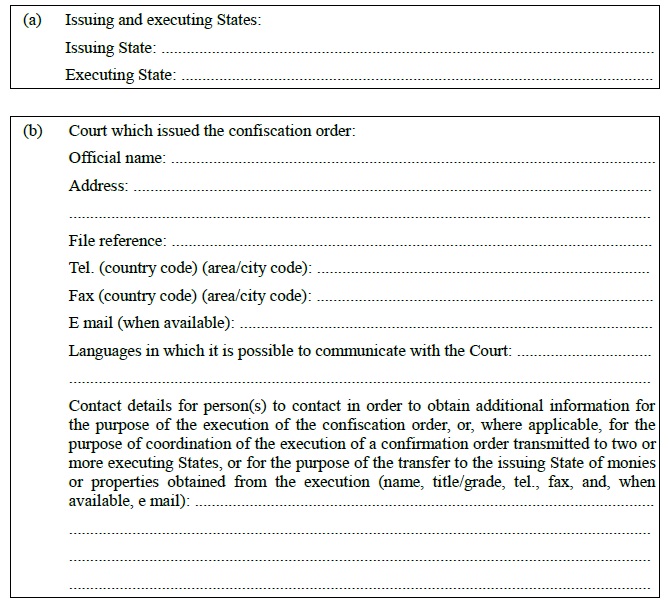
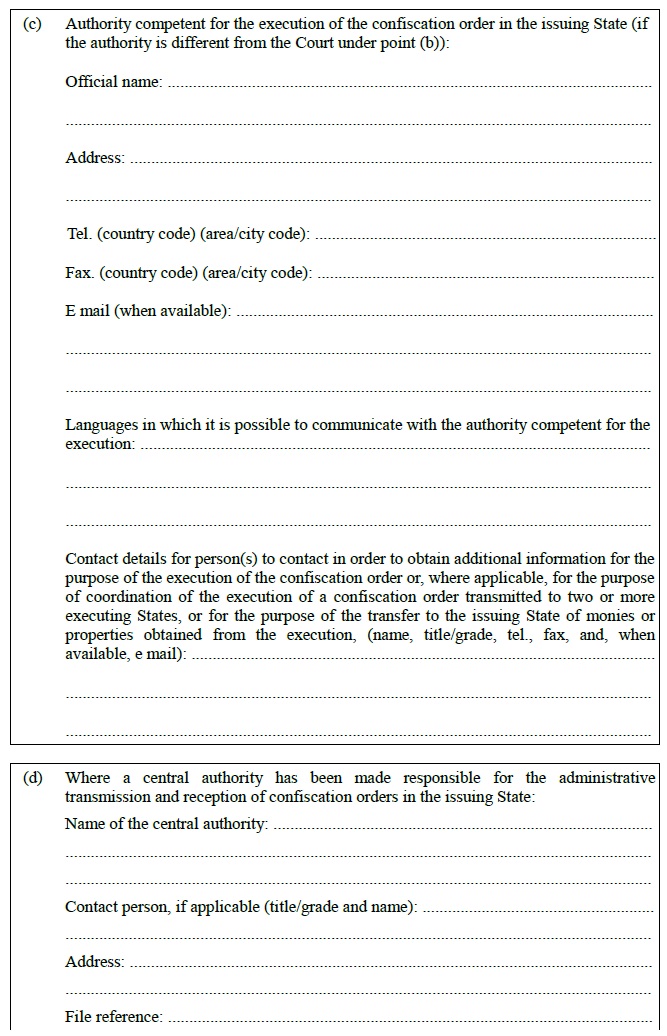
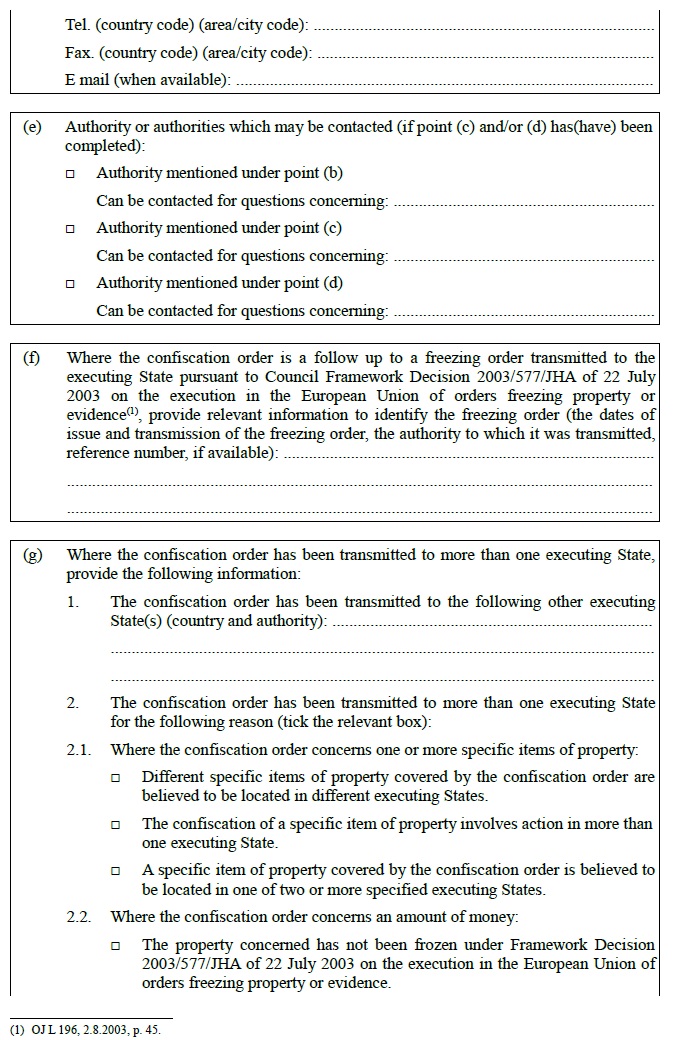
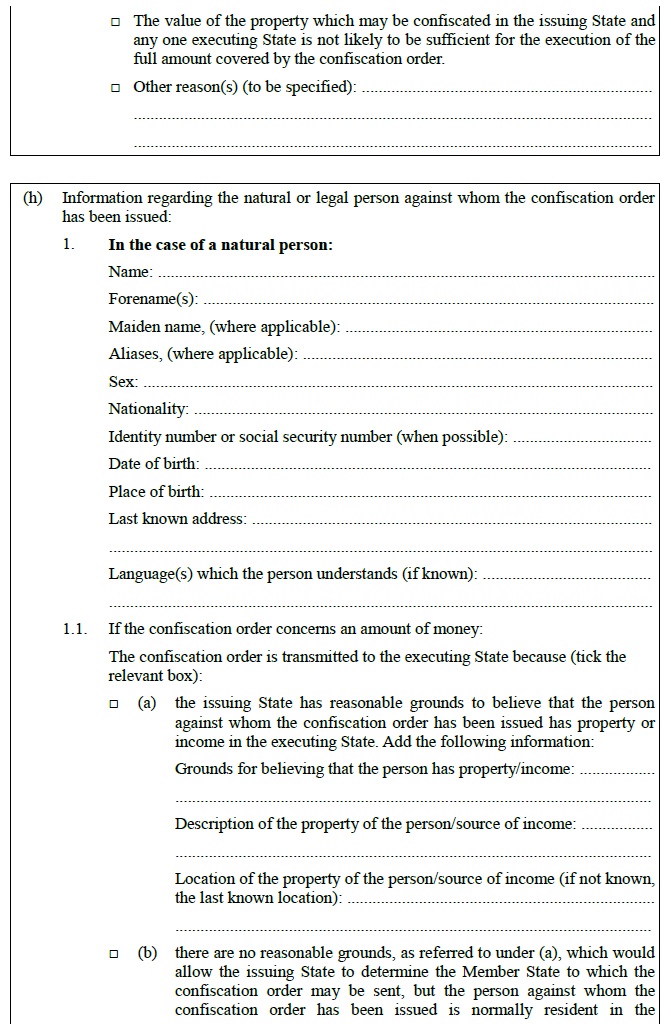
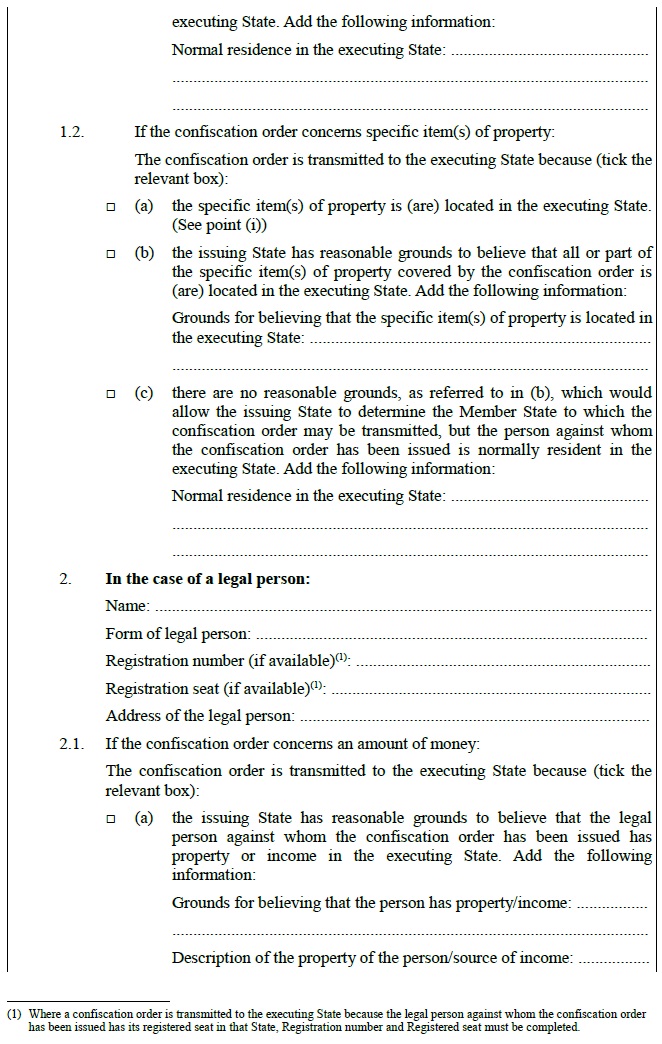
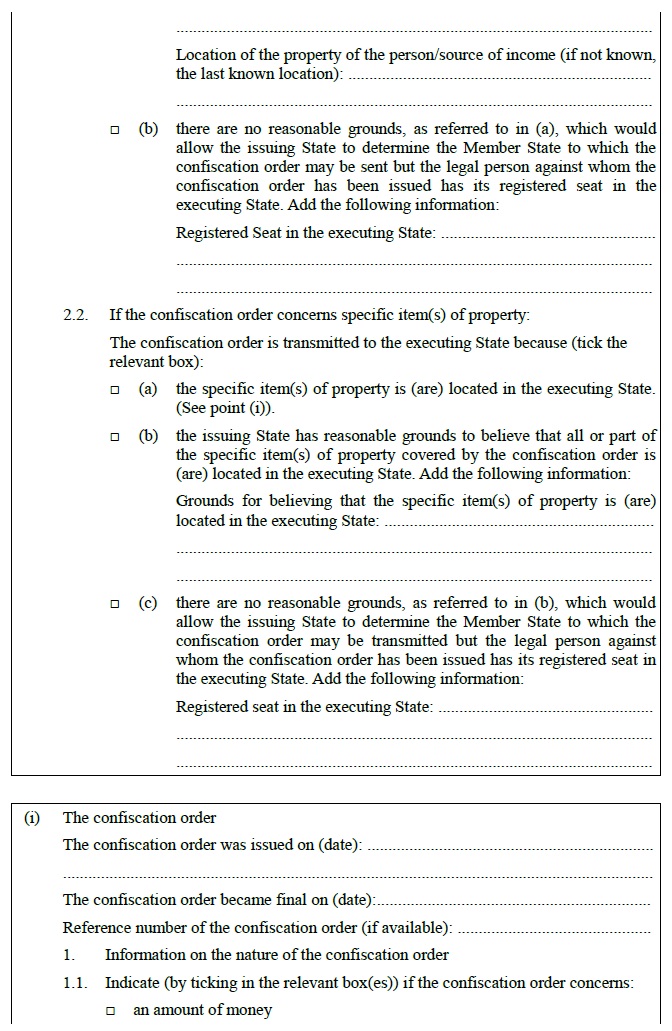
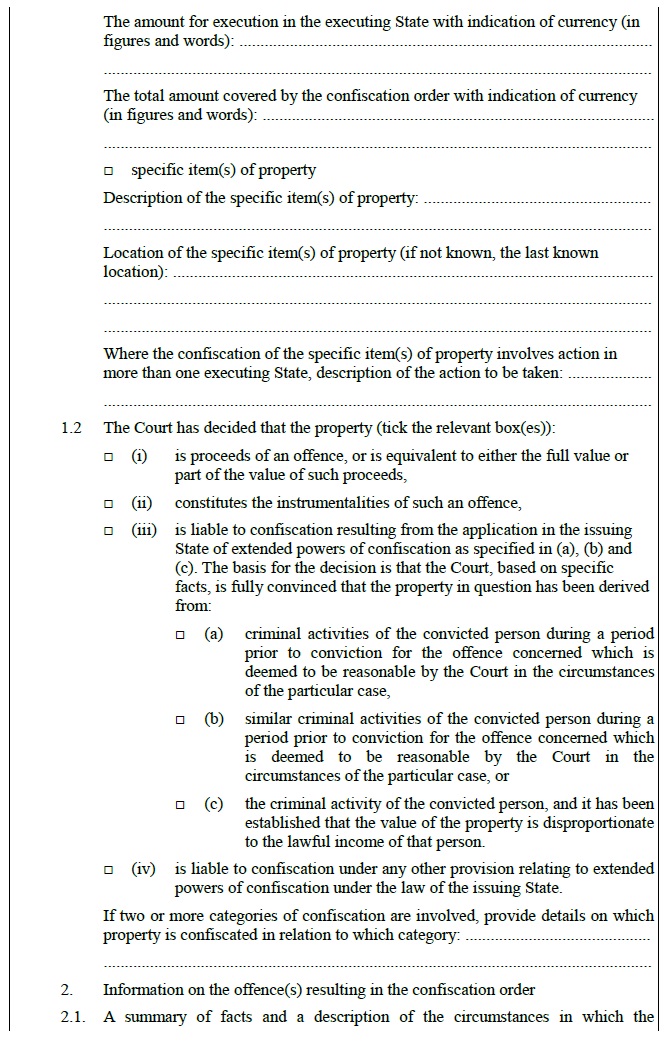
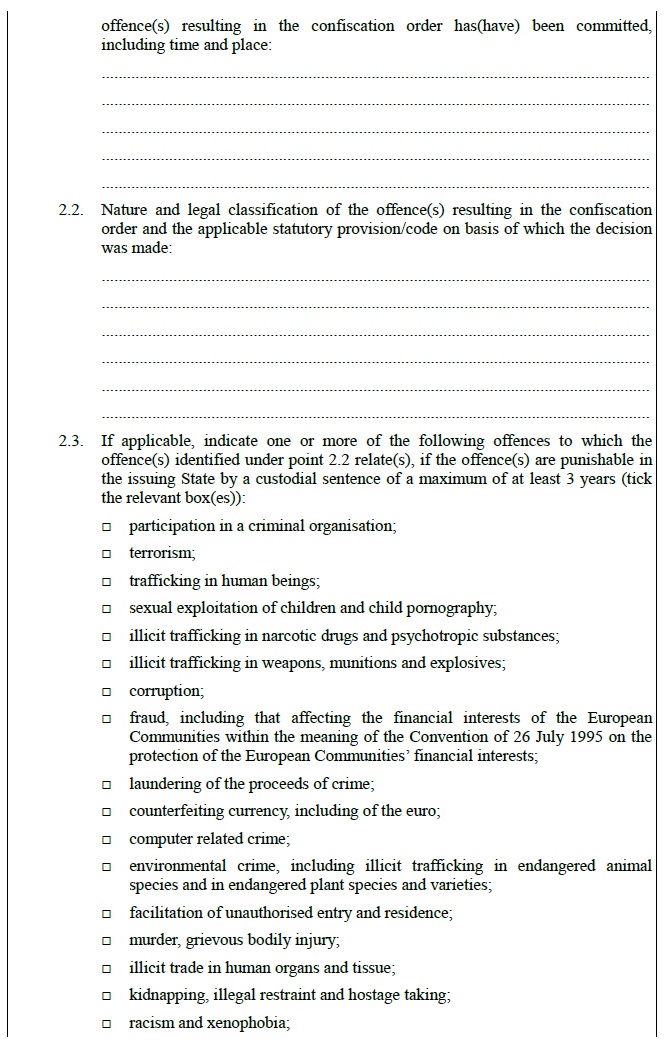
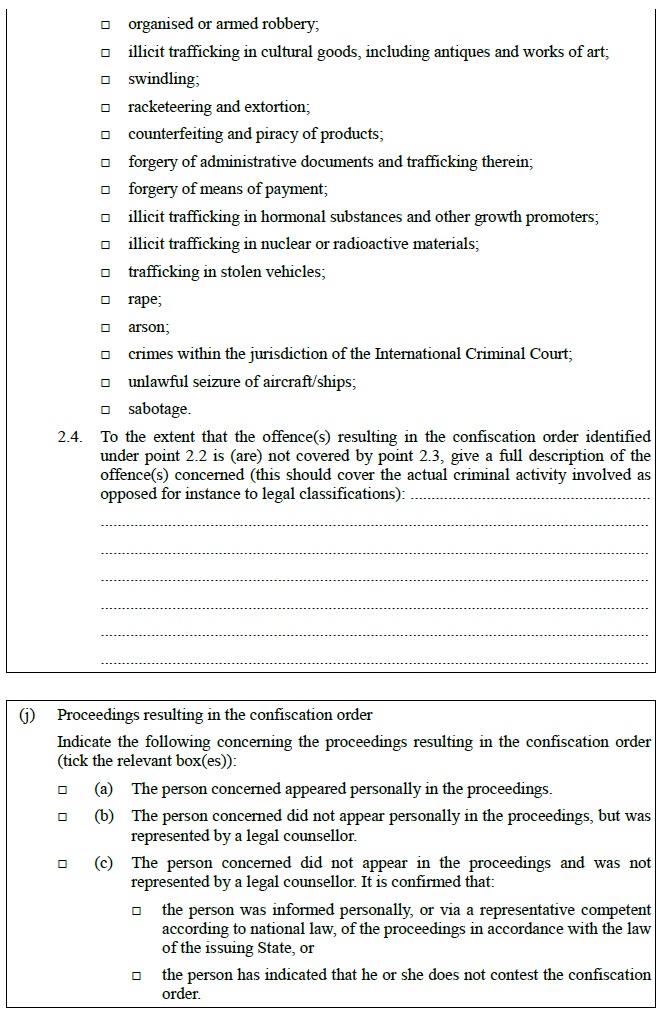
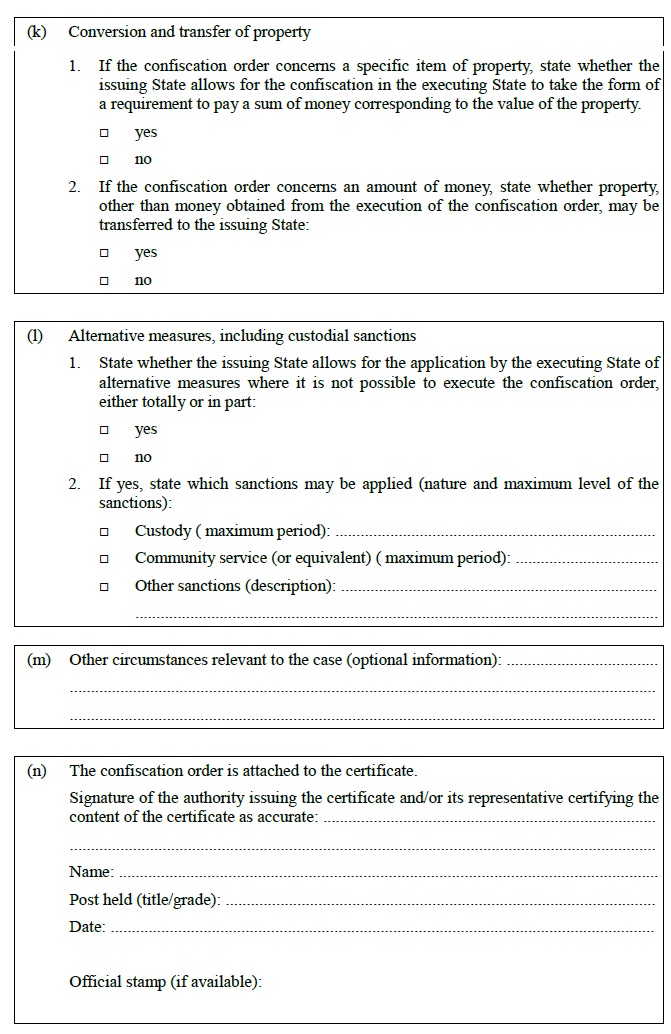 ]
]
Annotations
Amendments:
F179
Inserted (1.02.2016) by Criminal Justice (Mutual Assistance) (Amendment) Act 2015 (40/2016), s. 33(c) and sch. 3, S.I. No. 11 of 2016.

